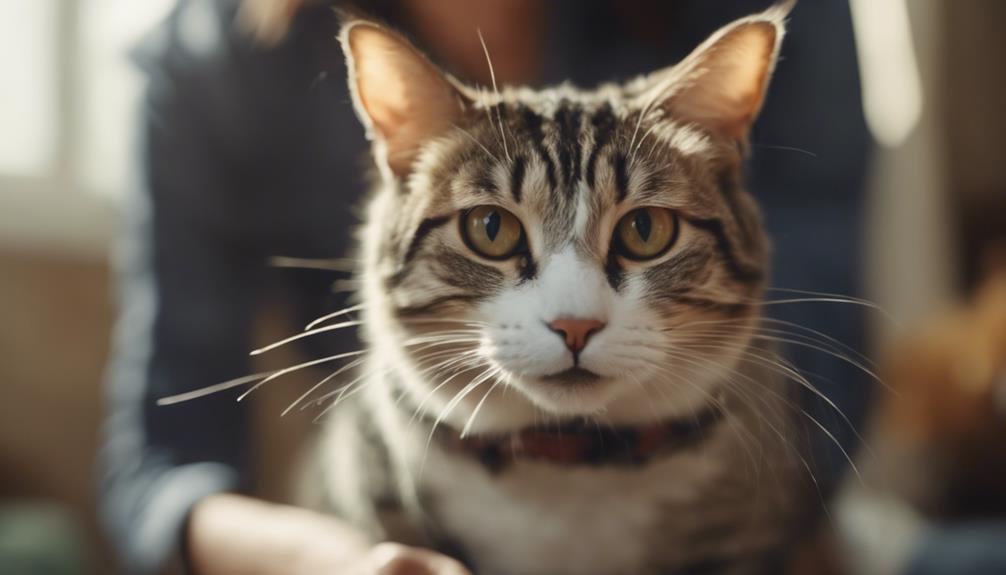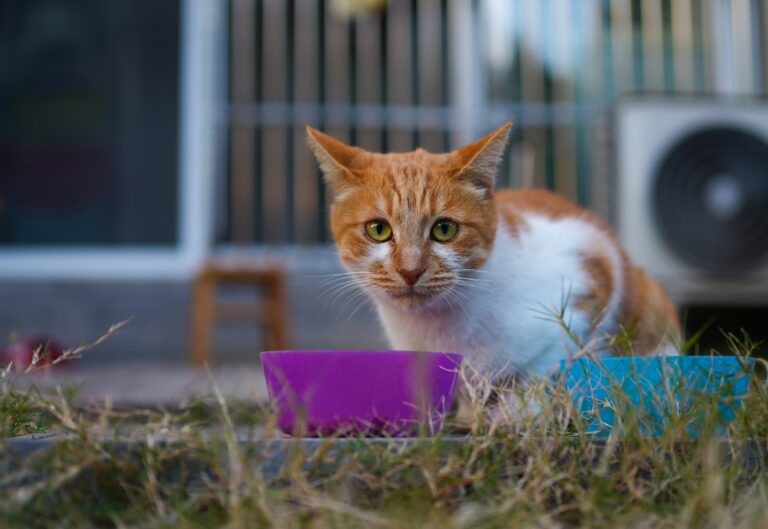How Do I Stop My Cat From Bringing Mice Into The House

How Do I Stop My Cat From Bringing Mice Into The House: Coming home to find your cat proudly presenting you with a mouse as a gift. While this gesture may be well-intentioned, dealing with unwanted rodents in your living space can be a hassle. So, how can you put an end to this behavior and keep your home mouse-free? By understanding your cat’s instincts and employing a few strategic tactics, you can effectively discourage these hunting expeditions.
Understanding Your Cat’s Behavior
To understand why your cat brings mice into the house, observe their hunting instincts and territorial nature. Cats are natural hunters, and bringing prey home is a display of their instinctual behavior. It is essential to delve into cat psychology to comprehend why they exhibit such actions. Training methods can be employed to modify this behavior effectively.
Understanding your cat’s behavior is crucial in addressing the issue of bringing mice into the house. Behavior modification techniques can help deter this behavior. By creating a stimulating environment for your cat, providing interactive toys, and engaging in playtime, you can redirect their hunting instincts towards appropriate outlets.
Communication signals from your cat can also provide insight into their behavior. Pay attention to your cat’s body language and vocalizations. Cats may bring mice into the house as a means of communication, whether to show affection or as a territorial display. By understanding these signals, you can better address the root cause of their actions.
Secure Your Home’s Entry Points
Ensure the security of your home’s entry points to prevent your cat from bringing mice inside. Cat proofing windows and doors is crucial in keeping unwanted critters out. Start by inspecting your windows for any gaps or openings that a cat or mouse could squeeze through. Install sturdy screens or consider adding window guards to prevent your feline friend from accessing these entry points. For doors, make sure there are no large spaces at the bottom where a mouse could slip under. You can use door sweeps or draft stoppers to block off these areas effectively.
Blocking off entryways and exits is another essential step in securing your home. Check for any holes or cracks in walls, floors, or ceilings that could serve as passageways for mice. Seal off these openings using materials like steel wool or caulk. Pay special attention to spaces around pipes, vents, and electrical wiring as these are common entry points for pests. Additionally, consider installing pet doors that only open in response to your cat’s collar to prevent other animals from entering.
Provide Enrichment and Playtime
Engage your cat’s natural instincts and keep them entertained by providing ample enrichment and playtime opportunities. Cats are curious and active creatures that require mental stimulation and interactive play to satisfy their instinctual needs. Here are some ways to ensure your feline friend stays engaged and entertained:
- Interactive Toys: Invest in a variety of interactive toys such as feather wands, laser pointers, or puzzle feeders to keep your cat mentally engaged and physically active. These toys can mimic hunting behaviors and provide much-needed stimulation.
- Environmental Enrichment: Create a stimulating environment by adding cat trees, scratching posts, and hiding spots around the house. Cats love to climb, scratch, and explore their surroundings, so providing a stimulating environment can prevent boredom and unwanted behaviors like hunting mice.
- Scheduled Play Sessions: Dedicate regular playtime sessions with your cat to bond and engage in interactive play. Use toys that encourage chasing, pouncing, and jumping to keep your cat entertained and mentally sharp.
- Rotate Toys: To prevent your cat from losing interest, rotate their toys every few days. This simple trick can make old toys seem new and exciting again, keeping your cat entertained and less likely to resort to hunting mice for stimulation.
Use Deterrents and Repellents
To deter your cat from bringing mice into the house, consider using effective scent deterrents, setting up indoor barriers and traps, and employing outdoor repellent solutions. These methods can help discourage your cat from hunting and bringing mice indoors, creating a more mouse-free environment for you. By implementing these strategies, you can work towards reducing the instances of mice being brought into your home by your cat.
Effective Scent Deterrents
To deter your cat from bringing mice into the house, consider utilizing effective scent deterrents and repellents as a proactive measure. Cats have a keen sense of smell, which can be leveraged to discourage them from hunting mice indoors. Here are some options to try:
- Citrus-based sprays: Cats generally dislike the scent of citrus fruits like oranges and lemons. Spraying citrus-scented repellents in areas where your cat tends to bring in mice may help deter them.
- Herbal sachets: Placing sachets filled with strong-smelling herbs like lavender, rosemary, or mint near entry points can act as a natural deterrent.
- Vinegar solution: A diluted vinegar solution sprayed around the house can create a scent barrier that cats find unpleasant.
- Commercial cat deterrents: There are commercial products available that use natural ingredients like essential oils to discourage cats from specific areas.
Indoor Barriers and Traps
Consider implementing indoor barriers and traps as part of your strategy to deter your cat from bringing mice into the house. Catproofing solutions such as sealing off entry points and keeping food in secure containers can help prevent mice from entering your home. Training techniques like providing interactive toys and regular play sessions can redirect your cat’s hunting instincts.
Behavioral modification involves rewarding your cat for not bringing in mice and using deterrents like motion-activated alarms near potential entry points. Environmental adjustments, such as keeping outdoor areas tidy and free of debris, can reduce the chances of mice being close to your home. By combining these methods, you can create a less enticing environment for your cat to hunt mice indoors.
Outdoor Repellent Solutions
Implement outdoor repellent solutions using deterrents and repellents to discourage mice from approaching your home and prevent your cat from bringing them indoors. Here are some effective options to consider:
- Natural Remedies: Use natural repellents like peppermint oil, cloves, or cayenne pepper around the perimeter of your home to deter mice.
- Electronic Devices: Invest in ultrasonic devices that emit high-frequency sounds to repel rodents without harming them.
- Motion-Activated Sprinklers: Install motion-activated sprinklers in your yard to startle and deter mice from entering your property.
- Predator Urine: Consider using predator urine from animals like foxes or bobcats as a natural way to keep mice away from your home.
Maintain a Clean Environment
To prevent your cat from bringing mice into the house, maintaining a clean environment is essential. Effective pest control starts with good hygiene practices. Mice are attracted to food sources and clutter, making it crucial to keep your living spaces tidy. Here are some practical steps you can take to create an environment that is less inviting to mice:
Start by regularly cleaning up any food spills or crumbs. Mice have a keen sense of smell and will be drawn to areas where they can easily find food. Store all food, including pet food, in sealed containers to prevent easy access for rodents. Additionally, make sure to dispose of garbage promptly and securely.
In addition to food sources, mice are also attracted to clutter where they can hide and nest. Keep your home organized by decluttering regularly and sealing up any potential entry points such as gaps in walls or floors. By reducing hiding spots, you make it harder for mice to establish a presence in your home.
Maintaining a clean environment not only deters mice but also promotes a healthier living space for you and your pets. Implementing these simple hygiene practices can go a long way in keeping unwanted pests at bay and ensuring a comfortable home for everyone.
Establish a Feeding Routine
To prevent your cat from hunting mice, it’s crucial to establish a feeding routine that includes set meal times and an ample supply of food. Cats are natural hunters, and by ensuring they are well-fed on a regular schedule, they are less likely to feel the need to hunt for prey. Consistency in feeding times can help redirect their focus from hunting to enjoying their meals.
Set Meal Times
Establishing set meal times is crucial in training your cat to avoid bringing mice into the house. Cats are creatures of habit, and having consistent meal times helps regulate their hunting instincts. Here are some tips to help you establish a feeding routine:
- Consistency: Feed your cat at the same times each day to create a predictable routine.
- Limited Access: Avoid leaving food out all day; instead, offer meals at specific times.
- Positive Reinforcement: Reward your cat after meals to reinforce good behavior.
- Avoid Overfeeding: Stick to recommended portion sizes to prevent your cat from overeating and seeking additional prey.
Provide Ample Food
By ensuring your cat has ample food available at specific meal times, you can effectively establish a feeding routine that helps regulate their hunting instincts and discourages them from bringing mice into the house. Consistent feeding habits play a crucial role in managing your cat’s behavior.
Cats are natural hunters, and when they are hungry, they are more likely to exhibit hunting behaviors, such as bringing mice indoors. Make sure to provide high-quality cat food that meets their nutritional needs and offer it in portions at regular intervals throughout the day. This will help keep your cat satiated and less inclined to hunt for prey. Additionally, having food available will reduce their motivation to hunt for mice as they will not be as driven by hunger.
Consider Getting a Pest-Proof Cat Door
Consider investing in a pest-proof cat door to help prevent your feline friend from bringing unwanted guests into your home. A cat door designed to keep pests out while allowing your cat easy access can be a game-changer in maintaining a pest-free environment. Here are some reasons why a pest-proof cat door might be the solution you need:
- Convenience: A pest-proof cat door allows your cat to move in and out freely, reducing the likelihood of them feeling the need to hunt for prey indoors.
- Security: These doors are designed to keep out unwanted intruders like mice, rats, or insects, providing a safe and secure environment for your cat.
- Peace of Mind: With a pest-proof cat door, you can relax knowing that your cat can enjoy the outdoors without bringing pests inside, minimizing the chances of infestations.
- Efficiency: By investing in a pest-proof cat door, you are taking a proactive step towards pest control, making your home less attractive to unwanted critters.
Installing a pest-proof cat door is a practical and effective way to prevent your cat from bringing mice into the house while ensuring they have the freedom to roam outdoors.
Consult With a Veterinarian
To address any health concerns or behavioral issues related to your cat’s hunting behavior, seeking guidance from a veterinarian is crucial. Veterinarians can provide valuable insights into behavior modification techniques and training strategies to help curb your cat’s hunting instincts. Through professional guidance, you can better understand why your cat engages in hunting behavior and how to redirect their focus.
Behavior modification is a key aspect that veterinarians can assist with. They can recommend specific training techniques tailored to your cat’s individual needs. By implementing these techniques consistently, you can help discourage hunting behaviors and promote alternative, more appropriate activities for your cat.
In addition to behavior modification, veterinarians may also suggest environmental enrichment and play therapy. Environmental enrichment involves creating a stimulating environment for your cat, which can help reduce their desire to hunt. Play therapy, on the other hand, can provide an outlet for your cat’s energy and predatory instincts in a controlled and safe manner.
How Do I Stop My Cat From Bringing Mice Into The House Frequently Asked Questions
Can I Train My Cat to Not Hunt or Bring Mice Into the House?
To prevent your cat from hunting mice, effective training methods and behavioral modifications can be successful. Consistent positive reinforcement, interactive play, and providing alternative activities can redirect your cat’s natural instincts.
Are There Any Natural Remedies or Deterrents That Can Help Keep Mice Away From My Home?
To naturally keep mice away from your home, try using natural repellents like peppermint or cedarwood essential oils. DIY deterrents such as sealing entry points and using ultrasonic devices can also help create an unfriendly environment for mice.
Should I Be Concerned About My Cat Getting Sick From Hunting and Bringing Mice Into the House?
You should be concerned about your cat’s health when hunting and bringing mice into the house. To prevent risks, ensure your cat is up to date on vaccinations and dewormed regularly. Monitor for any signs of illness and contact your vet promptly.
Will Getting Another Cat Help Discourage My Current Cat From Bringing Mice Into the House?
Having another cat might not stop your feline from bringing mice into the house. Cat behavior and sibling rivalry can continue even with feline companionship. Cats may still display territorial behavior, so it’s not a guaranteed solution.
How Can I Tell if My Cat Is Bringing Mice Into the House Without Actually Seeing the Mice?
To spot signs of mice without seeing them, observe your cat’s behavior, like excessive hunting or sudden interest in specific areas. Look for droppings, chewed items, or nests. Seal entry points, use repellents, and keep food secured to prevent mice from entering your home.
Conclusion
In conclusion, by understanding your cat’s behavior, securing entry points, providing enrichment, using deterrents, maintaining cleanliness, establishing a feeding routine, and considering a pest-proof cat door, you can effectively prevent your cat from bringing mice into your home. Remember to consult with a veterinarian for additional guidance and support in addressing this behavior. With patience and consistency, you can create a safe and mouse-free environment for both your cat and yourself.








